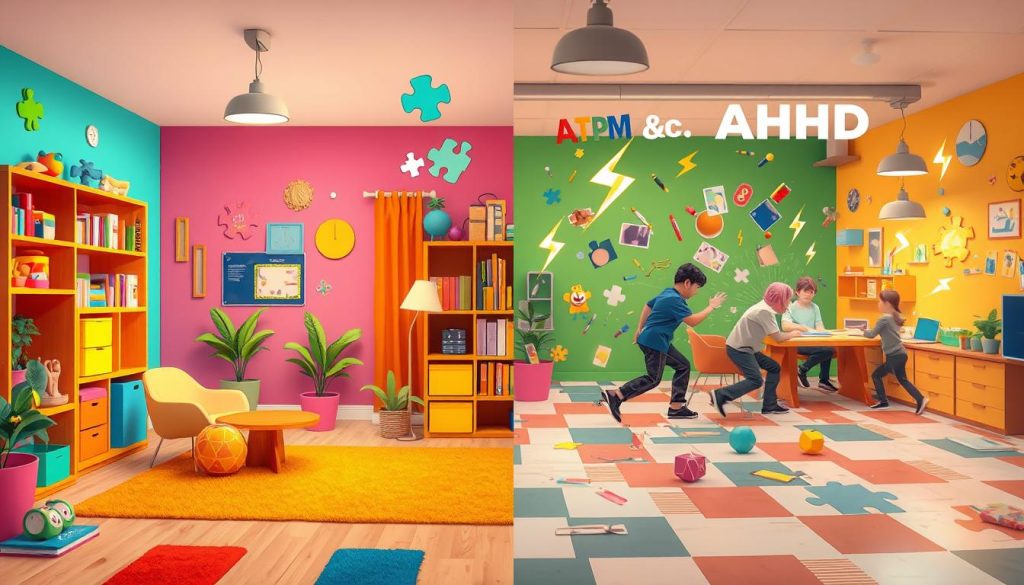Autism and ADHD are two neurodevelopmental disorders that often cause confusion. They share some traits but are distinct conditions with unique features. This guide will help you understand the differences between autism and ADHD, highlighting their key characteristics.
We’ll look at how these disorders affect social skills, communication, and behavior. By the end, you’ll have a clearer picture of autism and ADHD. You’ll understand their impacts on daily life and how they’re diagnosed and treated. Let’s dive in and unravel the complexities of these often misunderstood conditions.
Understanding Neurodevelopmental Disorders: Autism and ADHD Basics
Neurodevelopmental disorders impact brain function and behavior. Autism and ADHD are two common ones. Let’s look at their main features and debunk some myths.
Defining Autism Spectrum Disorder
Autism is a complex disorder that affects social skills, communication, and behavior. Symptoms vary a lot. Some people have trouble with eye contact and reading social cues.
Understanding Attention Deficit Hyperactivity Disorder
ADHD affects focus, impulse control, and activity levels. Symptoms include trouble staying on task, fidgeting, and talking too much. Some also struggle with organization and time management.
Common Misconceptions About Both Conditions
Many myths surround these disorders. Autism doesn’t mean a lack of empathy or intelligence. ADHD isn’t just about being hyper.
Both conditions are complex and unique to each person. Understanding them helps create a more inclusive society.
- Myth: Autism and ADHD are the same disorder
- Fact: They are distinct conditions with different symptoms
- Myth: Only children have these disorders
- Fact: Both can persist into adulthood
What Are Differences Between Autism and ADHD
Autism and ADHD are two different neurodevelopmental disorders. Each has its own set of symptoms. Knowing the differences is key for the right diagnosis and support.

Autism makes social communication hard. People with autism might find it tough to understand social signals, keep eye contact, or talk back and forth. They often have strong interests and repeat certain actions.
ADHD, by contrast, mainly affects how well someone can focus and control impulses. Those with ADHD might find it hard to stay on task, get organized, or sit quietly for long. They tend to be very energetic and act without thinking.
It’s worth noting that autism symptoms usually show up earlier than ADHD symptoms. Autism signs can be seen as early as 18 months. ADHD is usually diagnosed after age 4.
- Autism: Challenges in social interaction, repetitive behaviors, sensory sensitivities
- ADHD: Difficulty focusing, hyperactivity, impulsiveness
Both conditions can affect daily life but need different management and support. Knowing the differences helps in giving the right care and accommodations for those with autism or ADHD.
Distinguishing Social Interaction Patterns
Social interactions vary between autism and ADHD. Knowing these differences helps spot autism symptoms and adhd symptoms. This leads to better support for those affected.
Social Challenges in Autism
Those with autism face social communication hurdles. They might find it hard to read facial expressions or grasp social cues. This can cause social skills deficits, making it tough to make friends.
Social Behaviors in ADHD
ADHD impacts social interactions in its own way. People with ADHD might talk too much or interrupt others. They could also have trouble staying focused in conversations, which can strain relationships.
Impact on Relationships and Friendships
Both conditions can make keeping relationships hard. Autism can make it hard to see things from others’ viewpoints. ADHD can lead to forgetfulness or impulsive actions that upset friends and family.
| Aspect | Autism | ADHD |
|---|---|---|
| Social Cues | Difficulty interpreting | May miss due to inattention |
| Conversation | Struggle with back-and-forth | May dominate or interrupt |
| Friendships | Challenges forming connections | Difficulty maintaining long-term |
Communication Skills and Language Development
Communication and language growth vary between autism and ADHD. Kids with autism often face language delays, a key sign of autism. They might find it hard to talk and understand others, making it tough to connect socially.
ADHD symptoms don’t usually include language delays. Children with ADHD usually learn to talk like their peers. But, they might have trouble organizing their thoughts or keeping a conversation on track.
Autism can impact both listening and speaking skills. Some with autism might not speak at all. Others might know lots of words but find it hard to use them in social talks.
ADHD mainly affects how well someone can express themselves. Kids with ADHD might talk too much, interrupt, or answer before a question is asked.
| Aspect | Autism | ADHD |
|---|---|---|
| Language Delays | Common | Rare |
| Verbal Communication | Often impaired | Generally intact |
| Non-verbal Communication | Frequently affected | Usually normal |
| Conversation Skills | Difficulty with back-and-forth | May dominate conversations |
It’s key to understand these differences in communication and language growth. This helps in making the right diagnosis and support for those with autism or ADHD.
Behavioral Patterns and Executive Functioning
Autism and ADHD have different ways of behaving and handling tasks. These differences affect how people interact and manage their daily lives.
Repetitive Behaviors in Autism
Autism often shows through repetitive actions. This can be hand-flapping, rocking, or repeating words. These actions might offer comfort or help with sensory issues. They can also show intense interests in certain topics.
Impulsivity and Hyperactivity in ADHD
ADHD is known for hyperactive and impulsive behaviors. Kids might find it hard to sit, talk too much, or act without thinking. Grown-ups might feel restless or make quick decisions without thinking about the outcomes. These traits can affect work and social life.
Organization and Planning Differences
Both conditions impact executive functioning in unique ways. Autism might make someone great at organizing but hard to adapt. ADHD often leads to trouble with time and staying organized. They might find it hard to start tasks or keep plans because of attention issues.
- Autism: Strong focus on details, difficulty with big picture
- ADHD: Struggles with sustained attention, easily distracted
- Both: May need support with daily planning and organization
Knowing these differences helps in creating better support for those with autism or ADHD. Customized strategies can enhance daily life and overall well-being.
Sensory Processing and Environmental Responses
Sensory processing issues are key in both autism and ADHD. Though they share some traits, how they affect sensory experiences is different.
People with autism are often very sensitive to sensory inputs. They might react strongly to loud sounds, bright lights, or certain textures. Some might even seek out intense sensory experiences, like spinning or rocking.

ADHD symptoms related to sensory processing show up in different ways. Those with ADHD might find it hard to ignore sensory information they don’t need. This can make them easily distracted. They might also move around a lot to stay focused.
Environmental responses differ between the two conditions:
- Autism: They often prefer routine and struggle with changes.
- ADHD: They thrive on new things and get bored with the same old.
Knowing these differences is key to creating the right support for each condition. Let’s look at how sensory experiences differ in autism and ADHD:
| Aspect | Autism | ADHD |
|---|---|---|
| Sensory Sensitivity | Often heightened | Variable |
| Reaction to Stimuli | May be extreme | Often subtle |
| Sensory Seeking | Specific sensations | General stimulation |
| Environmental Preference | Structured, predictable | Dynamic, changing |
Understanding these sensory processing issues is vital. It helps create supportive environments for those with autism or ADHD. Tailored strategies can greatly improve their daily lives and overall well-being.
Early Warning Signs and Developmental Milestones
It’s key to spot early signs of neurodevelopmental disorders early. Parents and caregivers should know the signs that might point to autism or ADHD in young kids.
Early Autism Indicators
Autism symptoms can show up before a child is three years old. They might:
- Not make eye contact
- Not talk or babble on time
- Not react to their name by 12 months
- Do the same actions over and over or have odd body positions
Early ADHD Indicators
ADHD symptoms often start to show in early school years. Look out for:
- Too much fidgeting or squirming
- Hard time sitting down
- Struggling to wait for their turn
- Often interrupting or cutting into conversations
Age of Onset Differences
Autism signs usually show up in infancy or early toddlerhood. ADHD symptoms, on the other hand, often start around age 3-6. A study shows that these differences grow more obvious after age 5. This study stresses the need to keep watching children as they grow to catch neurodevelopmental disorders early.
Diagnosis Process and Medical Assessment
Diagnosing neurodevelopmental disorders like autism and ADHD is a detailed process. Each condition has its own way of being diagnosed. Knowing these differences is key for a correct diagnosis and treatment.

Autism diagnosis involves a thorough evaluation. Doctors look at behavior, communication skills, and developmental history. They use tools like the Autism Diagnostic Observation Schedule (ADOS). Parents might notice signs early, leading to evaluations as young as 18 months.
ADHD diagnosis focuses on behavioral assessments. Doctors search for signs of inattention, hyperactivity, and impulsivity. Diagnosis usually happens later than autism, often in school years when attention issues become clear.
| Aspect | Autism Diagnosis | ADHD Diagnosis |
|---|---|---|
| Age of Diagnosis | As early as 18 months | Usually school-age |
| Key Assessment Areas | Social interaction, communication, behavior | Attention, hyperactivity, impulsivity |
| Common Tools | ADOS, ADI-R | Rating scales, behavioral checklists |
| Duration of Assessment | Several hours over multiple sessions | Often shorter, can be one or two sessions |
Both diagnoses need to rule out other conditions and look at family history. The complexity of these disorders often requires a team of specialists for accurate diagnosis.
Treatment Approaches and Interventions
Managing neurodevelopmental disorders like autism and ADHD needs a personal touch. Effective treatments focus on specific symptoms, helping improve daily life and happiness.
Behavioral Therapies
Applied Behavior Analysis (ABA) helps with autism, teaching communication and social skills. Cognitive Behavioral Therapy (CBT) is good for both, teaching how to cope and manage emotions.
Medication Options
ADHD often gets better with stimulant meds, which help with focus and less hyperactivity. For autism, meds might help with anxiety or aggression, but not the core symptoms.
Educational Support Strategies
Individualized Education Programs (IEPs) are key for both autism and ADHD. They might include things like extra time on tests, quiet spots, or visual aids to help with learning.
| Intervention | Autism | ADHD |
|---|---|---|
| Behavioral Therapy | ABA, Social Skills Training | CBT, Behavior Management |
| Medication | Symptom-specific (e.g., for anxiety) | Stimulants, Non-stimulants |
| Educational Support | Visual schedules, Sensory accommodations | Organizational tools, Frequent breaks |
Treatments may vary, but the aim is the same: to help people with neurodevelopmental disorders reach their best. Regular checks and updates to treatment plans are vital as needs evolve.
Impact on Learning and Academic Performance
Neurodevelopmental disorders like autism and ADHD can really affect a child’s learning. Kids with these conditions face special challenges in school. They need special help to do their best.

Students with autism might find it tough to work in groups or talk in class. They might do well in subjects they love but struggle with others. Kids with ADHD often have trouble focusing. This makes it hard for them to listen in class or finish homework on time.
Schools use many ways to help:
- Individualized Education Programs (IEPs)
- Sensory-friendly classrooms
- Structured routines and visual schedules
- Assistive technology for organization
- Frequent breaks for students with attention deficits
By understanding each student’s needs, teachers can make learning spaces more welcoming. This way, students with autism and ADHD can overcome their hurdles. They can then do well in school and look forward to a bright future.
Managing Daily Life and Routine Challenges
Living with autism or ADHD brings its own set of daily challenges. People with autism often need structured routines and find it hard with unexpected changes. Their repetitive behaviors can be comforting but make it tough to be flexible.
Those with ADHD face different issues. Their hyperactive behaviors make it hard to follow schedules or finish tasks. They might have trouble with time management and organization, leading to missed deadlines or forgotten appointments.
Both conditions can also affect how they handle sensory information. People with autism might be too sensitive to certain sounds or lights. On the other hand, those with ADHD might seek out intense sensory experiences. This impacts how they handle places like school, work, or public areas.
- Create visual schedules to manage daily tasks
- Use timers to break activities into manageable chunks
- Implement sensory-friendly spaces at home and work
- Develop consistent bedtime routines for better sleep habits
Changing the environment can help. For autism, it might mean reducing sensory overload. For ADHD, it could involve fewer distractions. Both groups benefit from clear, structured routines and patience from those around them.
With the right strategies, people with autism and ADHD can better handle daily challenges. Support from family, friends, and professionals is key in developing these coping mechanisms. It helps improve their quality of life.
Support Systems and Resources Available
Families with neurodevelopmental disorders like autism and ADHD need a strong support network. This network helps them manage the challenges of these conditions. It’s key to navigating the daily life of autism symptoms and adhd symptoms.

Family Support Networks
Parents and siblings are vital in supporting those with autism or ADHD. Support groups bring families together, sharing emotional support and practical advice. They help families cope with daily life by sharing experiences and strategies.
Professional Support Services
Experts like psychologists and occupational therapists offer targeted help. They work with families to create personalized plans. This includes advice on managing behavior, improving social skills, and supporting academics.
Educational Resources
Schools have programs for students with neurodevelopmental disorders. They offer individualized education plans and classroom help. Online resources and libraries provide information on autism and ADHD, helping families understand and tackle challenges.
- Support groups for families
- Specialized therapists and counselors
- School-based programs and accommodations
- Online resources and educational materials
Coexisting Conditions and Overlapping Symptoms
Neurodevelopmental disorders like autism and ADHD often go hand in hand. This makes it hard to diagnose and treat them. It’s key to know the differences between autism and ADHD when symptoms blend together. Many people show traits of both, making it tough to figure out their needs.
Autism and ADHD share some common signs, like trouble focusing, socializing, and controlling impulses. This can hide one condition or lead to wrong diagnoses. For instance, a child with autism might have trouble paying attention, like someone with ADHD. On the other hand, someone with ADHD might act in repetitive ways, similar to autism.
Studies show that 50-70% of people with autism also have ADHD. This shows how important it is to do thorough checks to get the right diagnosis and treatment.
| Symptom | Autism | ADHD | Overlap |
|---|---|---|---|
| Social difficulties | Yes | Yes | High |
| Attention problems | Sometimes | Yes | Moderate |
| Repetitive behaviors | Yes | Sometimes | Low to Moderate |
| Hyperactivity | Sometimes | Yes | Moderate |
It’s vital to understand that autism and ADHD can both be present at the same time. A team of experts can help find and meet the unique needs of those with these conditions.
Future Outcomes and Long-term Considerations
Looking ahead, we see that autism and ADHD affect people for their whole lives. These conditions shape their careers and ongoing support needs. For those with autism, symptoms often last, impacting social life and daily routines.
Many adults with autism find success in jobs that value detail and specialized knowledge. ADHD symptoms may change, but challenges with focus and organization often stay. Adults with ADHD often do well in dynamic settings that match their energy and creativity.
Both groups might need ongoing support to manage their unique traits. This could include therapy, workplace adjustments, or life skills coaching. The good news is that awareness of these disorders is growing.
This awareness leads to better resources and understanding in schools and workplaces. With the right support, individuals with autism or ADHD can lead fulfilling lives. They can make valuable contributions to society. The key is to focus on strengths while addressing challenges, ensuring a bright future for those living with these conditions.
FAQ
Q: What are the main differences between autism and ADHD?
A: Autism and ADHD have different main symptoms. Autism includes social communication challenges and repetitive behaviors. ADHD is about attention problems and hyperactivity.
Autism also has sensory sensitivities and language delays. ADHD does not typically have these.
Q: Can a person have both autism and ADHD?
A: Yes, it’s possible to have both autism and ADHD. This is called comorbidity. Studies show many people with autism also have ADHD, and vice versa.
Having both can make diagnosis and treatment harder.
Q: How do social skills differ between individuals with autism and those with ADHD?
A: People with autism struggle with social cues and conversations. Those with ADHD might have trouble with social skills too, but they usually understand social norms better.
Q: Are there differences in language development between autism and ADHD?
A: Yes, there are big differences. Autism often leads to language delays, with some not speaking at all. ADHD usually has normal language development but might struggle with speech organization.
Q: How do repetitive behaviors manifest differently in autism compared to ADHD?
A: Autism shows repetitive behaviors as routines and intense interests. ADHD might show as fidgeting or restlessness.
Q: What are the differences in sensory processing between autism and ADHD?
A: Autism has more intense sensory processing issues. ADHD might have some, but they are less severe.
Q: How do early warning signs differ between autism and ADHD?
A: Autism early signs include delayed language and limited social engagement. ADHD signs are excessive activity and impulse control problems.
Q: Are there differences in the diagnosis process for autism and ADHD?
A: Yes, the diagnosis processes are different. Autism diagnosis involves detailed behavioral assessments. ADHD diagnosis requires observing behavior in different settings and might include neuropsychological tests.
Q: How do treatment approaches differ for autism and ADHD?
A: Autism treatment focuses on behavioral therapies and speech therapy. ADHD treatment includes behavioral therapy and medication. Both need professional evaluation.
Q: What are the long-term considerations for individuals with autism versus those with ADHD?
A: Autism long-term needs include ongoing support for social skills and independent living. ADHD long-term focus is on managing symptoms in school and work. Both need lifelong strategies, but the needs differ.


















